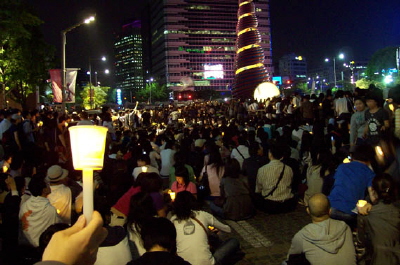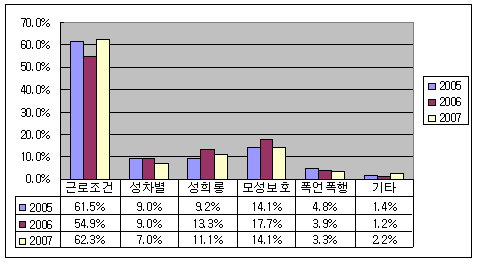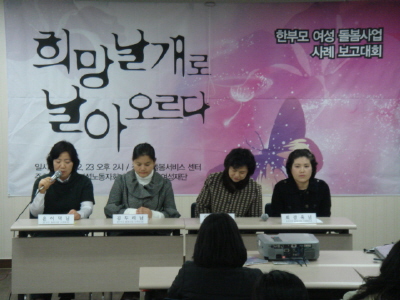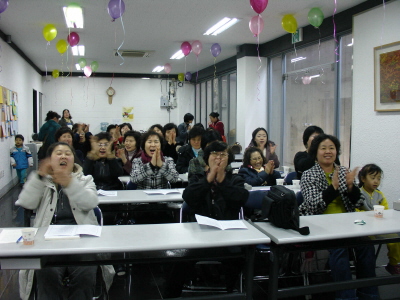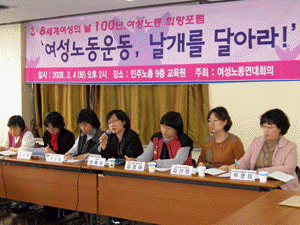KWWA's Activity Plans & Major Tasks in 2008
by Choi Sangrim (chairperson, KWWA)
Since the Korean economic crisis in 1997 the words such as globalization, social polarization, working poor people, irregular workers have often been heard in the Korean society. We are living in the tough society where 'economic growth cannot tackle unemployment', 'employment cannot solve poverty' nor 'people cannot overcome the big gaps between regular workers and irregular workers, large-sized companies and very small companies, rich people and poor people, students studying very well and those who have poor scores.' The great majority of women lead a very hard life, but they cannot be linked to the labor movement which usually aims to guarantee lifelong jobs and welfare in the workplace, regular workers, and family wages, which are far from irregular women workers' demands. In order to improve conditions for women workers, there should be affirmative attempts to empower 'women workers, so that they can weave their hopes'. Various forms of movements should be applied to women workers' movement in order to 'introduce fair wages and social securities as means of overcoming the boundary of companies' and 'creating alternative living.' (quoted from The Evaluation of KWWA for 20 Years).
1. Consolidating organizational capabilities to react to women workers' demands and situations
Women workers lead very hard lives in the shade of social polarization. Only 6% of women workers are organized into trade unions, and so most of them are isolated like small islands in the big ocean. Women workers are involved in very various types of jobs and their demands are so diverse, and so it is not easy to organize them into one form of trade union. Korean Women Workers Association (KWWA) called as its major activity tasks, for a variety of their reasonable demands suitable to their situations in order that women workers involved in very various types of jobs can improve their conditions for themselves.
KWWA has made a variety of organizational efforts including the foundation of National Cooperative of House Managers to improve house caretakers' rights, expanding single parents organizations and meetings to enhance their qualities of lives, the establishment of a cooperative society to unite women workers and solve their problems by themselves, and organizing meetings for after school program workers and helped them develop their leadership. At the very beginning in 2008, we at KWWA adopted the following activity plans for our members to carry out systematic activities and for women workers and activists to consolidate their capabilities, after reflecting how well we have made contribution to empowering Korean women workers:
■ Activity Plan in 2008
(1) We will Re-arrange and activate activities for organizing members (by Organization Committee)
․ Composed by KWWA, IWWA, AWWA, PWWA, North Cholla WWA, PWWA
․ Contents:
- Checking regional situations to activate the organization of members and probing for development strategies.
- Reorganizing education manuals for members (new comers and staff) and supporting education programs in regions.
- Planning workshops for regional chairpersons and organizational staff members on how to organize members.
(2) We will develop educational programs for full-time activists to grow as sincere women labor activists (by Education Committee)
․ for new activists (history, activities, visions and values of women workers organizations)
․ training for strengthening activities by region (counseling, organization, policy making, PR, and training.)
․ Developing leadership (Understanding leadership, operating organizations, self-introspection and communication, women workers' movement.)
(3) We will 'address development strategies of membership structures,' policy discussion amongst chairpersons and staff - chairpersons' meeting in June.
(4) We will provide training for instructors on organizational activities
․ Composed by instructor training plan team : KWWA, SWWA, Suwon WWA, IWWA, and Korean Community Information Network.
․ Contents: Planning training programs for operating democratic structures and to cultivate staff members' capacities at grassroots levels.
2. KWWA has called for legal changes to overcome the polarized labor market
A symposium was held in celebration of 20 years of KWWA, entitled “Women’s Work, Changes for 20 years and Prospect.” Dr. Chang Ji-yeon highlighted people are divided into two social strata: the one with guaranteed proper salaries and social security, enjoying social insurances, but the other socially vulnerable class who has nothing. She found Korean social insurance systems only benefit social insurance payers. She suggests to overcome the unfair systems should be an essential task to change women workers' economic status.
■ KWWA calls for the implementation of equal pay for work of equal value to overcome worsening polarization in the labor market
Traditionally no equal pay for work of equal value has not been implemented in Korea, nor is social standard of equal pay for work of equal value decided legally, and so job evaluation system has not socially been in progress. Despite, in order to practice sufficient wage negotiations by industry the implementation of equal pay for work of equal value cannot be delayed as a standard for narrowing down wage gaps segregated by company and by type of work. Besides, in order to prevent very serious wage differences like nowadays because of the introduction of unsystematic and discriminatory groups of occupations in near future, to those who will be changed to regular workers after 2 year irregular jobs, caused by a planned enactment, social agreement on equal pay for work of equal value should be discussed and collected as a rational standard.
For this, social mediation for enhancing sufficient redemption for discriminatory wages caused by the enactment of irregular workers, should be implemented in practice, and especially prevention clauses on discrimination against indirect and irregular workers should be made, who are different from full time workers at parent companies and/or contracting companies, and social mediation for transferring company-led job evaluations to gender sensitive ones should be carried out.
■ Increase in the number of 4 social insurance beneficiaries and expansion of social security on meditation and housing
Less than 30% of Korean women workers are protected by Korean laws. In near future, if there is no dramatic increase in social insurances for women workers, the expansion of some protective enactments and social insurances will not be able to affect women workers positively. In order to overcome this terrible situation, the expansion of the 4 social insurances should be expanded from regular workers protected by Labor Standard Law to all types of workers, and the government needs to support employers from its general account. In addition, fees and costs paid by poor people who should be targeted foremost should be reduced, and so they should not be excluded from the social security net.
Besides, the increasing number of single family due to removal of lifelong jobs, caused by the vulnerable labor market, and the social changes in which there have been decreasing childbirths and tremendous rise in the number of aged people, are able to be put in increasing blind spots and to become increasing social risks. In particular, the poorer women the higher medical and housing fees, and so they still remain as poor working people although they work hard. The government should increase the number of public housing and council housing, expand medical and education benefits and supports, and introduce systematic social insurance systems, so that basic livelihoods of poor people can be maintained.
■ 2008' Activity Plan
(1) We will conduct research on wage conditions for the women workers who are long term contracted workers and workers whose tasks become changed after the implementation of the Enactment of Irregular Workers and will raise social issues for gender-sensitive job evaluation:
- conducted by KWWA, Korean Women's Trade Union, and researchers
(2) We will carry out research for achieving equal pay for work of equal value and for gender sensitive job evaluation and weaving networks about these issues.
(3) We will demand and become involved in socal supports for low-pay and/or irregular workers and call for expanding four social insurances for workers in the informal sector.
3. Alternative social activities for overcoming ruling thinking from the labor market
KWWA evaluated its last 20 year activities. Although KWWA has struggled a lot, but women workers' situations which have not been improved much, should be diagnosed and alternative discourses are needed to develop. Women workers' movement confronting neo-liberalism should be expanded not only to the workplace but also their lives. To tackle women workers' problems, quality of life along with wages and discrimination should be treated and alternative discourses, philosophies and case studies are needed to look at. KWWA has been struggling against globalization of capital generating more consumption, environmental destruction and socioeconomic polarization, KWWA has tested and reviewed a variety of methods such as alternative lifestyles in which people consume less but have higher quality of life, environmentally friendly lifestyle that save me, my society and this planet, and alternative economic movement focusing cooperation and mutual help rather than competition and effectiveness.
KWWA has carried out a variety of activities including child care services for low income families with care workers sent to home, single parent family support activities, workers' self-motivated cooperatives and low income family care service support activities, in order to have better approaches to the lives of poor people, but these activities have not been able to become well-established as a social movement producing alternative values yet. The movement is not to struggle to seize much more, but to find and develop alternative values, in order to improve the quality of life and, to lead better lives in harmony with others.
■ 2008' Activity Plan
(1) We will organize a study group in women's movement to look at how to have high quality of lives in spite of earning less.
․ Composed by instructor training plan team : KWWA, PWWA, Cholla WWA, SWWA, DWWA, Masan & Changwon WWA and some researchers.
․ Contents:
- To grope for alternative discourses and activities to expand women workers' movement.
- To develop new values and visions, not ruling values, which should be practiced in our lives with great confidence.
- To dig out cases and look at practical strategies about alternative mode of lives.
- To organize workshops for regional branch organizations to participate in producing alternative activities.
(2) We will organize discussions amongst full-time staff and representatives : In our representatives' meeting in October, we will make activity plan in 2009.
(3) We will make the network of hope : We will create economic communities to give and share what we need.
